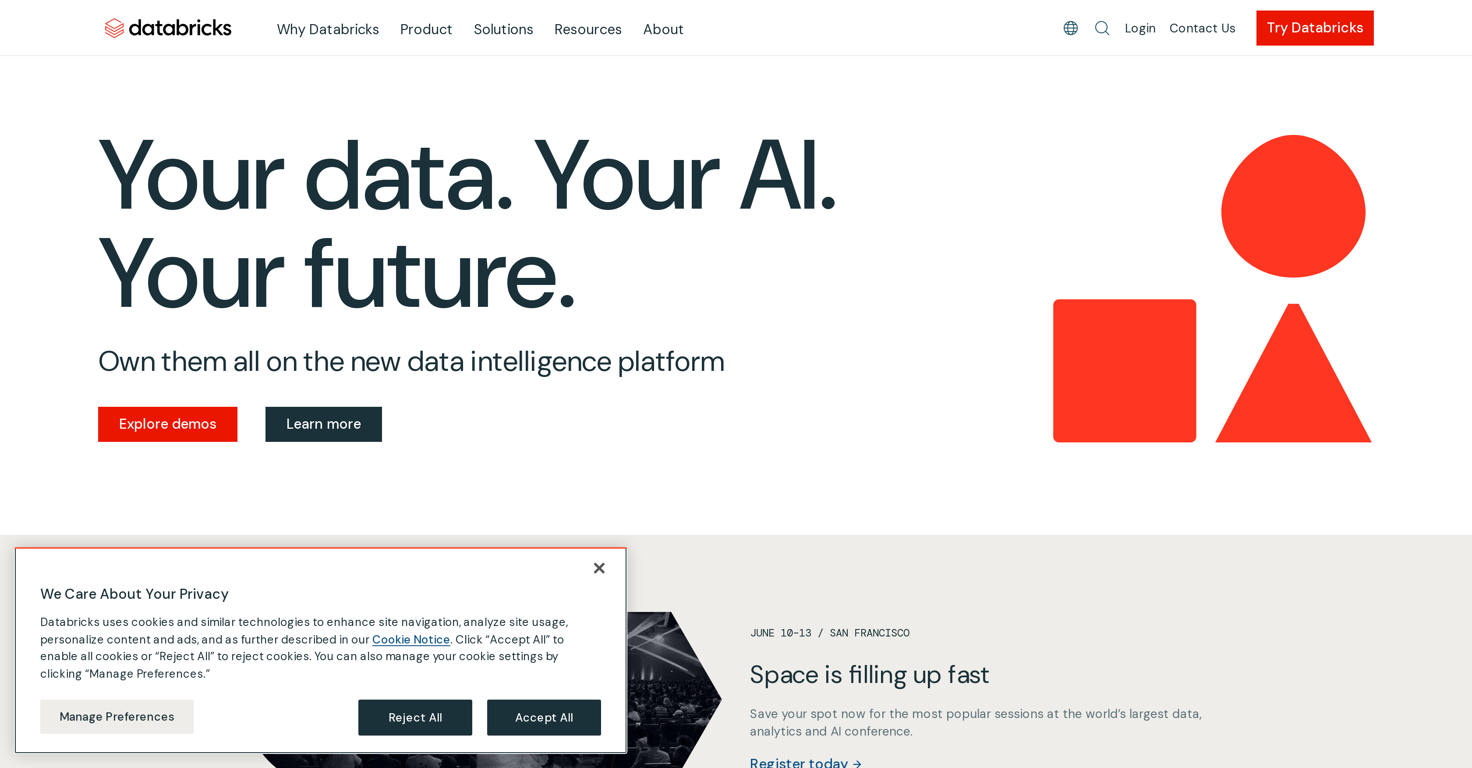What are the primary features of Databricks?
The significant features of Databricks include a serverless data warehouse for SQL analytics, ETL and orchestration for both batch and streaming data, data reliability and security guarantee, real-time analytics provision, and collaborative data science at scale. Additionally, the platform fosters the development of generative AI applications, complies with needs of data privacy and control, and empowers all users in an organization to uncover insights from data via natural language. It also provides additional functions including training, certification, events, blogs, podcasts, and customer support.
Can I integrate my existing tools with Databricks via the Lakehouse feature?
Yes, Databricks allows integration of your existing tools with its shared data space called 'Lakehouse'. With this feature, you can connect your current tools to Databricks, facilitating building, marketing, and growing your business models by leveraging easy access to shared data.
What kind of AI applications can I build and deploy using Databricks?
With Databricks, you can construct and deploy a diverse range of AI applications, primarily focusing on machine learning and generative AI. The platform provides tools and infrastructure to develop sophisticated AI systems, involving data ingestion, preprocessing, training models, evaluating their performance, and eventually deploying them into production for making predictions.
How does Databricks support collaborative data science at scale?
Databricks endorses collaborative data science at scale. Its platform is designed to bolster team collaboration by enabling multiple users to work simultaneously on data and machine learning models. This promotes a shared understanding, improves the pace of innovation, and facilitates harmonious production of more robust predictive models, thus boosting the collective productivity.
How does Databricks respect data privacy and control in the development of generative AI applications?
Databricks supports the development of generative AI applications without compromising on data privacy or control. It ensures that all data used in AI model development complies with stringent privacy norms and is managed with a high degree of control. The platform also offers governance features to maintain data accountability and traceability thus ensuring privacy compliance.
Can every user in an organization uncover insights from data using Databricks?
Yes, Databricks is designed to empower all users in an organization to glean insights from data. The platform facilitates this via natural language process, allowing not only data scientists but all users to dig insights from the data, thus driving a data-driven decision-making culture throughout the organization.
What kind of training and support does Databricks provide?
Databricks provides a robust set of training and support services. These include comprehensive training modules, certification programs, online events, blogs, and podcasts designed to enhance users' knowledge and skills. Furthermore, Databricks extends customer support services to address technical queries and issues promptly and efficiently.
What is the 'Lakehouse Architecture' in Databricks?
The 'Lakehouse Architecture' in Databricks is a new kind of data platform that combines the best elements of data lakes and data warehouses. This architecture offers an open, reliable, and secure platform that allows you to harness the power of your data with optimal performance. This unified platform facilitates easy data management, data analysis, and integration of artificial intelligence, simplifying complex data workflows.
Does Databricks offer any solutions for data migration and deployment?
Yes, Databricks offers solutions for data migration and deployment. It provides professional services to effectively migrate your data to the Databricks platform with minimal downtime and disruption. Moreover, it supports the building, deploying, and scaling of various AI, big data, and analytical solutions on its robust platform.
What industries can benefit from using Databricks?
Databricks caters to a diverse range of industries, including communications, media and entertainment, financial services, public sector, healthcare & life sciences, retail, and manufacturing among others. The platform provides targeted features and solutions that address the specific requirements, challenges, and objectives of these varied industries, contributing to the optimized functioning and growth of businesses across the spectrum.
How does Databricks facilitate ETL and orchestration?
Databricks possesses ETL and orchestration features designed to manage both batch and streaming data. Its ETL capabilities allow for the extraction of data from a variety of sources, its transformation to a suitable format for analysis, and its loading into a database or data warehouse. Concurrently, the orchestration mechanisms streamline the order and coordination of these ETL jobs, ensuring efficient data processing.
How can I estimate my compute costs on Databricks?
Yes, Databricks provides a cost calculator feature that lets you estimate your compute costs on any cloud. This tool helps you anticipate your expenses by factoring in elements like the type of workload, the capacity required, runtime hours, and more.
Can I build generative AI applications without sacrificing data privacy on Databricks?
Yes, Databricks allows the development of generative AI applications without sacrificing data privacy or control. The platform ensures stringent privacy norms are followed during the development and deployment of AI models. It provides governance features to maintain data accountability, control, and privacy without hampering the process of AI application generation.
How does Databricks unify data, AI and governance for businesses?
Databricks systemizes the integration of data, AI, and governance by unifying these three crucial aspects on one single platform. It enables efficient data management, facilitates the deployment of AI and machine learning capabilities, and ensures effective governance through standardized frameworks. This unification allows for more efficient business operations, reduced complexity, increased speed of insight derivation, and overall improved business performance.
Does Databricks offer any cost estimation tools?
Yes, Databricks platform provides a cost calculator. This tool helps organizations estimate their compute costs on any cloud. By inputting details like the type of workload, capacity requirements, and runtime hours, users can get a comprehensive cost estimation for utilizing the resources of Databricks.
 MongoDB - Build AI That Scales
MongoDB - Build AI That Scales




How would you rate Databricks?
Help other people by letting them know if this AI was useful.